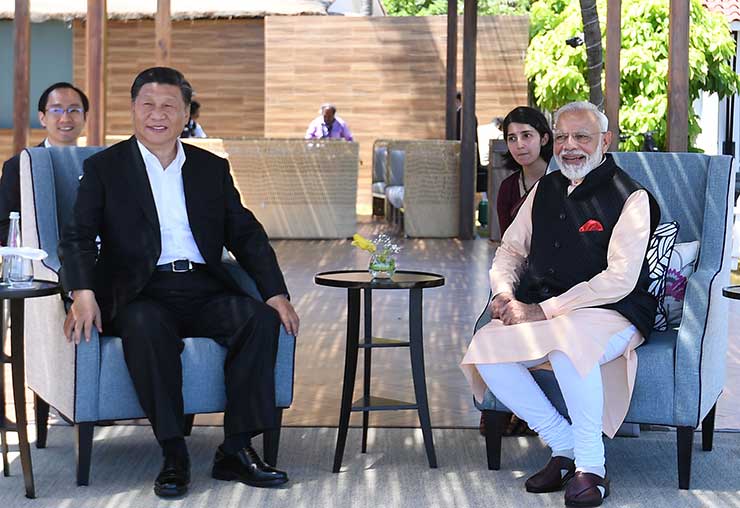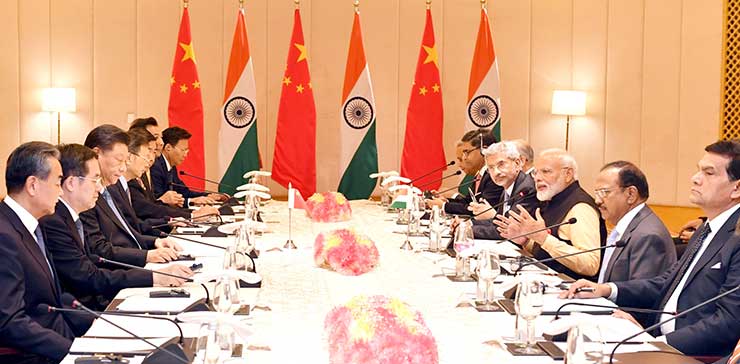
Taking place in the backdrop of the abrogation of Article 370 which had given special status to Jammu and Kashmir and creation of Union Territories of the border state, the Second Informal Summit between Indian Prime Minister Narendra Modi and his Chinese counterpart Xi Jinping on October 11 and 12 in the historical city of Mamallapuram near Chennai, saw the two leaders holding talks in a cordial atmosphere discussing a wide variety of issues ranging from bilateral, regional and global.
Without mentioning the issues that have been a bone of contention between the two big Asian neighbours, the talks were held in an atmosphere free of tension with Prime Minister Modi saying that the ‘Chennai Connect’ would “add great momentum” to the bilateral relations between the two nations.
Modi-Xi summit was aimed at enhancing the rapport the leaders built when they met for the first Informal Summit in the Chinese city of Wuhan in 2018 to help stabilize ties between these two great economies. Heads from both sides had an in-depth exchange of long-term and strategic issues of global and regional importance. Xi said that he and Modi held “candid discussions as friends”, and Indian PM also mentioned “a new era of cooperation” between the two countries.
INDIA-CHINA ECONOMIC TIES
In spite of long-standing territorial disputes, China and India have strong economic ties. India’s ambassador to Beijing Vikram Misri said bilateral trade between India and China was set to cross $100 billion (€90 billion) by the end of this year. India and China together account for 17.6% of the global economy. Both the countries are neighbors and the bilateral trade between them is estimated at $84 billion in 2017/18 compared to US-China trade volume which stood at almost $600 billion. Foreign Direct Investment (FDI) into India has risen from less than $25 billion in 2014 to $45 billion in the last fiscal year during the Modi government.
There is a trade imbalance between both nations and China is in quest of being a major player in the growing Indian market. Modi and Xi agreed to promote exchanges and mutual learning among civilizations to achieve joint development and prosperity.
Chinese company Xiaomi has tripled the number of Smartphone plants in the Indian market. Beijing is also looking for the Indian market for its telecom giant Huawei especially after facing increasing pressure and restrictions from the US and its allies.

INDIA-CHINA TIES AND KASHMIR ISSUE
The Sino-Indian Informal Summit took place amid strained ties between the two Asian nations over Kashmir which has been in a state of lockdown since Modi Government abrogated its special status on August 5, 2019.
The restive region is a flashpoint between the nuclear-armed archrivals India and Pakistan. China has also territorial claims in the Kashmir region. India has de facto control over about 45% of the region, while Pakistan controls around 35% and the remaining 20% is under the control of China. China claims about 90,000 square kilometers (35,000 square miles) in the Indian state of Arunachal Pradesh. Chinese refer to Arunachal Pradesh as “Southern Tibet”. India also claims sovereignty over 38,000 square kilometers (15,000 square miles) of the Aksai Chin plateau which is in Chinese control. Chinese premier Xi stated, “the right and wrong of the situation was clear and both India and Pakistan should resolve the dispute via peaceful dialogue”. India already cleared that any change to its Jammu and Kashmir state is an internal affair.
The prevailing scenario in the region raise several questions such as can India trust China over Kashmir issue? After the brief Sino-Indian border war in 1962, there has always been a border dispute between the nations. In 2018, there was a month-long military standoff over Doklam, a disputed region in the “trijunction” between India, China and Bhutan. This was resolved after Modi-Xi meeting.
India’s decision in August 2019 to withdraw special status for Kashmir drew sharp condemnation from Pakistan and China. China supports Pakistan at U.N. Security Council against Indian Parliament scrapping Article 370 in Kashmir. China’s close security ties with Pakistan have long been a matter of concern in New Delhi.
In recent years India has drawn closer to the United States and East Asian and ASEAN nations to help balance China’s rising weight across the region. India closely monitored the Chinese Premier Xi’s state visit to Nepal after 22 years by any Chinese premier.
Under One Belt one Road policy, China has deepened ties with India’s neighbours like Pakistan, Bangladesh and Sri Lanka by building ports and power stations in an arc stretching to India in the form of “ String of Pearls” in the Indian Ocean region.
China and Pakistan are having close economic, diplomatic and military ties and both the countries are considered one of the closest allies in the region. According to think tank CSIS, between 2008 and 2017, Islamabad purchased more than $6 billion of Chinese arms. China has also invested billions in the China-Pakistan Economic Corridor and Pakistan is also an “all-weather ally” of China.
However, both India and China are concerned about Islamist extremism and China is wary of increasing Islamist activity in its Xinjiang region.
China is also worried about the expansion of the “Islamic State” (IS) militant group in the region. It believes that the Taliban and other radical groups in Afghanistan are providing assistance to Xinjiang militants. China and India are equally concerned about these militant groups. However, China must accept the reality that many of these militant groups are backed by Pakistan. As political- strategic analyst Siegfried O. Wolf said “China’s Uighur has an unusual source of friction in China-Pakistan and Afghanistan-Pakistan ties but have also added to regional instability”.
CONCLUSION
Chinese Premier Xi’s India visit has shown the maturity to compartmentalize both countries relationship in a way that disputes do not overshadow areas of cooperation.
Indian Prime Minister Modi said ‘Chennai Connect’ begins a New Era of Cooperation in India-China Relations”. Chennai Informal Summit provided an opportunity for India and China to continue their discussions on overarching issues of bilateral, regional and global importance. The informal one-on-one meeting of both leaders cannot bring a paradigm shift in bilateral ties, but this meeting enhances cordial relationships between them to some extent.
Recent trade war and geopolitical rivalry has escalated between Beijing and Washington and also fresh row over Hong Kong and Xinjiang. Xi’s two-day visit to India was a much-needed success for Beijing in order to elevate trade ties with New Delhi despite their often testy relations. The contentious issues like Kashmir, One Belt One Road (OBOR) Plan and Huawei 5G networks have not been discussed which shows this meeting was more symbolic than substantial from both sides.








